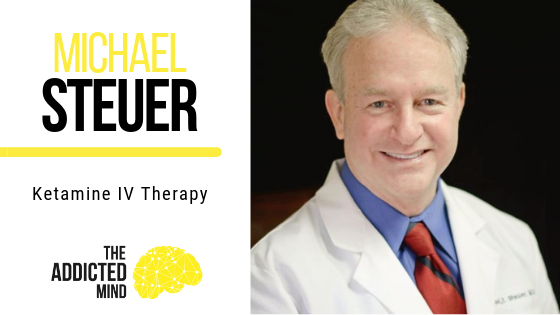Our guest on this episode of The Addicted Mind podcast is Dr. Michael Steuer of the Pacific Ketamine Institute in Los Angeles. Dr. Steuer’s training and practice have mainly been in the areas of anesthesia and pain management, but for the past 5+ years, he has shifted his focus somewhat to the use of ketamine to treat depression, mood disorders, addiction, and chronic pain.
Before 2013, when the effectiveness of ketamine for these purposes was discovered, the main drugs to treat depression and mood disorders such as PTSD were SSRIs and SNRIs (Selective serotonin reuptake inhibitors and Serotonin-norepinephrine reuptake inhibitors). While these medications were effective in temporarily treating the symptoms of depression and mood disorders, they often took weeks or months for patients to feel their effects and they often came with unpleasant side effects.
While ketamine has been abused by people for its hallucinogenic properties in high doses, it has been found that lower doses have minimal short-term side effects and patients typically begin feeling relief from their symptoms during the infusion or shortly thereafter. Even patients with “treatment-resistant” depression or chronic pain feel better almost immediately, and these feelings are sustained for weeks or months after each infusion. It is recommended that patients have 6 infusions over 2 weeks in order to jump-start their recovery and most patients continue to receive one infusion per month to maintain their results.
In the case of chronic pain, many people are prescribed narcotics or opioids, which essentially intercept the messages being sent from the body to the NMDA receptor of the brain which regulates mood and pain and the drugs themselves have addictive potential. Ketamine has proven to be more effective in modulating pain as well as addictive impulses, depression, and mood because it heightens the brain’s ability to recognize the signals being sent. This property causes ketamine to treat the root cause of the pain, rather than masking it like many opioids do. There are no known addictive properties of ketamine, making it safe for use in prescribed doses and frequencies, which may differ from person to person.
Dr. Steuer’s message to listeners who are struggling with depression is that you don’t have to be alone or feel like you want to give up. Reach out, because there are people who want to help.
Connect with Dr. Steuer:
(424) 332-5550
Connect with The Addicted Mind:

